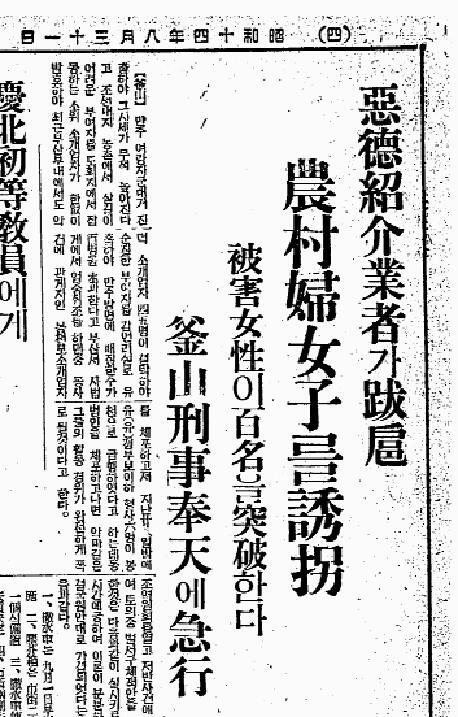Today, I happened to talk to a Japanese woman aged 97 who has lived in a home for the aged for 8 years or so. She still reads newspapers and watches TV news programs every day. Her interest ranges from home economics to international political issues. She is well versed in every subject the average Japanese adults find interested in.
She all of a sudden started to talk about "comfort women" now drawing public interest in Japan, obviously knowing that Osaka Mayor Hashimoto's repeated statements on "comfort women" have stirred up criticism and disapproval from overseas.
She recalls that in 1940s no one had ever questioned about parents selling their daughters for the sake of alleviating poverty since there existed no such a system publicly established as to extend help to the poor families both in Japan and in Korea.
Daughters sold to brothels or others were well aware that their families would not survive if they refused to be sold. It was not a matter of willingly or unwillingly at all but it was a matter of helping their families to survive.
None denies that some women were tricked into prostitution by swindlers or even by their neighbors. None denies that some women were abducted and sold to brothels. However, neither the Government of Japan nor Imperial Japanese Army was involved in forcing them into prostitution, contrary to what some Japanese leftists claim in collaboration with the government of south korea.
"Comfort women" had felt better off and had found it joyful and fulfilling to serve as professional prostitutes, thinking that they were supporting their families. However, nothing changed the fact that they were virtually sold as prostitutes in a sense that swindlers found loopholes in the laws being enforced since 1872. One of the typical loopholes often used among swindlers was to conclude a loan agreement allowing the poor parents to receive advance payment as a means of evading compliance with the laws that formally prohibited human trafficking. They viewed this practice not as slavery or any sort in a western sense but as a way to pay back debts to them as loan sharks. There were cases in which those involved in this sort of business had been found guilty of violating the laws.
The most important thing we must keep in our mind when dealing with an issue of "comfort women" is that we must examine the issue in terms of the historical context, in which the prevailing concepts of human rights and human rights violations were practically non-existent in the world, or at least not as much as we emphasize them now, particularly as seen in the United States of America that still struggles with a number of the worst examples of human rights violations.

The above photo shows the travelling Korean comfort women joyfully crossing a river. The term "Comfort Women" is a translation of the Japanese word 慰安婦 pronounced ianfu, a euphemism for the word prostitute.

昭和14年(1939)8月31日の東亜日報。満洲の奉天で朝鮮人の悪徳紹介業者が跋扈して百人以上の農村女性誘拐されたので釜山から刑事を急行させたという記事。
The Dong-a Ilbo reports on rampant abduction of more than 100 Chinese girls by Korean
swindlers (those agents engaged in recruiting personnel) from villages in
Mukden, Manchukuo on August 31, 1939. Police investigators have been immediately
dispatched to Mukden from Busan, Korea.
Many articles of this sort have been found in Japan, informing the public that police was determined to eradicate abduction of girls both in Korea and in China.
Notes:
1.The Dong-A Ilbo
(literally East Asia Daily) is the leading newspaper in Korea, established in
1920, 10 years after Japan-Korean annexation.
2. The Great Empire of Manchuria was established in 1932 and continued to exist until 1945.
Related Articles:
Abduction of Chinese Village Girls by Korean Swindlers is Rampant.
Recent Comments